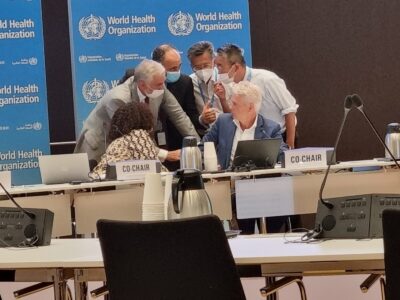Main content
Climate change is an increasing health concern in the Netherlands. Just looking at the past few months, the observed additional mortality due to record high temperatures and the significant health problems due to lesions caused by oak processionary caterpillars are examples that can be observed in a changing climate (see Table 1).[1,2] At the same time, Dutch society is already planning and implementing multiple climate mitigation measures (e.g. the National Climate Agreement) and adaptation measures (e.g. the National Adaptation Programme). These measures can create interesting opportunities to simultaneously improve our health (so-called health co-benefits). On the other hand, there are also concerns that they will be accompanied by unintended health risks (see Box 1). For example, urban greening is often mentioned as a climate adaptation measure to tackle the urban heat island effect. However, it requires careful design and implementation in order to avoid an increase in pollen concentrations or increasing urban populations of disease vectors such as mosquitoes and ticks.
In a recent publication, the European Academies’ Science Advisory Council (EASAC) stresses that the existing knowledge gaps relating to the health impacts of climate change and climate-related policies need to be addressed. [6] The Netherlands has always been one of the frontrunners in climate change research, facilitated by successful national research programmes such as Knowledge for Climate (Kennis voor Klimaat) and the Climate Change Spatial Planning Programme (Klimaat voor Ruimte). Unfortunately, health-related research has so far not been among the main objectives of these programmes. Consequently, many research questions relating to the health impacts of climate change (policies) in the Netherlands are still unanswered. It is, for example, still difficult to quantify the health impacts resulting from climate change or from specific climate mitigation and adaptation policies.
| Box 1: Side effects of climate policies – health co-benefits and unintended health risks The past years have witnessed an increasing call to consider the health implications of climate mitigation and climate adaptation measures, as they can create important health co-benefits as well as unintended negative health impacts.[4,5,6] Health impacts of climate mitigation measures are, for example:[3]
Health impacts of climate adaptation measures are, for example:[3]
|
| HEALTH IMPACT | EXAMPLES |
|---|---|
| HEAT STRESS | Additional mortality and morbidity due to more frequent and longer heat events, in particular in vulnerable groups (e.g. elderly, chronically ill). |
| ALLERGIES | Changes in the timing and duration of the pollen season can impact allergy-related health problems such as asthma and hay fever. Our climate can become more suitable for the spread of exotic allergenic species such as ragweed. In addition, changes in allergy symptoms caused by dust mite and the oak processionary caterpillar can be expected. |
| VECTOR-BORNE DISEASES AND ZOONOSES | Changes in the presence, population size/dynamics, and seasonality of vectors and disease pathogens. It is, for example, expected that the Dutch climate will become more suitable for the tiger mosquito, which can transmit diseases such as chikungunya, dengue and zika. |
| WATER-RELATED HEALTH IMPACTS | Changes in the geographical spread and seasonality of water-borne pathogens and infections such as Legionella. In addition, possible changes in pathogen concentrations in drinking water and the growth of blue-green algae (cyanobacteria) in surface waters need to be considered. |
| FOOD-RELATED HEALTH IMPACTS | Changes in the geographical spread and seasonality of water-borne pathogens and infections such as Salmonella, Campylobacter and Listeria. Impacts on crop yields and food quality (nutrients), resulting from, for example, extreme weather events, changing atmospheric CO2 concentrations and pests. |
| AIR POLLUTION | Changes in atmospheric concentrations of, for example, particulate matter and ozone can impact our health. Interactions with heat stress and pollen concentrations need to be considered. |
| ULTRA-VIOLET (UV) RADIATION | Climate can influence the amount of UV radiation via changes in cloud formation and the recovery of the ozone layer. This can affect, for example, skin cancer rates. |
Developing the dutch knowledge agenda
To get a better insight into the climate change related health risks in the Netherlands, the Organisation for Health Research and Development (ZonMw) asked the Dutch National Institute for Public Health and the Environment (RIVM), Maastricht University and Wageningen University & Research (WUR) to develop the Dutch Knowledge Agenda on Climate and Health. This agenda has identified studies that are required to explore and address the health implications of climate change and climate-related policies. Relevant knowledge gaps and research questions were identified through literature review and a broad consultation of stakeholders. The participatory consultation was based on two surveys complemented with in-depth interviews.
- The aim of the first survey was to identify the existing research questions within the theme Climate and Health. The questionnaire was sent to Dutch scientific experts (n=58) and consisted of mainly open questions.
- The aim of the second survey was to prioritize the different research topics. The questionnaire was sent to a broader group of stakeholders (n=114; e.g. scientific experts, policymakers at different policy levels, and professionals) and consisted of mainly closed questions.
- Interviews were conducted with 12 selected key stakeholders from a variety of backgrounds for an in-depth exploration of their knowledge needs and research questions.
Research priorities
The outcomes of the literature review, surveys and interviews were synthesized into five priority research topics for the Netherlands: [3]
- Integrated analysis of current and future health risks of climate change. This will require additional research into, for example, patterns of exposure and their spatial distribution, exposure-response relationships and vulnerable groups.
- The development, implementation and evaluation of measures to tackle current and future health effects of climate change (adaptation/prevention). This requires:
- The development and cost-benefit analysis of possible sets of policy measures, including consideration of health costs;
- The organisation of policy (advice) on climate change and health, with consideration for perception, behaviour and vulnerable groups;
- The development of knowledge sharing between research and practice, and providing information for various target groups.
- The development and implementation of an integrated monitoring and assessment system for both analytical studies and information supply (see points 1 and 2).
- Health impact assessment of climate adaptation measures. Consistent inclusion of health in the evaluation of climate adaptation measures (for example in the context of the Dutch National Adaptation Strategy) in order to prevent unintended negative health impacts and strengthen positive ones. The Dutch Environment and Planning Act offers an opportunity to link and optimize environmental, health, and climate policies with the aim of protecting and promoting health.
- Health impact assessment of climate mitigation. Consistent inclusion of health in the evaluation of climate mitigation measures (for example in the context of the National Climate Agreement) in order to prevent unintended negative health impacts and strengthen positive ones.
Outlook
Building on the literature review and consultation, the Dutch Knowledge Agenda on Climate and Health has identified key research areas that need to be addressed to explore and anticipate the health impacts of climate change and climate policies in the Netherlands. [3] The Knowledge Agenda forms the foundation for a coherent future national research programme. It explicitly calls for an integrated and interdisciplinary research approach. This does not only require cooperation between different scientific disciplines but also the active involvement of different policy sectors and practitioners (e.g. communities of practice). Together, we can create the knowledge needed to safeguard a healthy living environment and a healthy society in a changing climate.
References
- Centraal Bureau voor de Statistiek. Hogere sterfte tijdens recente hittegolf. https://www.cbs.nl/nl-nl/nieuws/2019/32/hogere-sterfte-tijdens-recente-hittegolf. [Accessed 9 August 2019].
- Kenniscentrum Eikenprocessierups. Inventarisatie ruim 20 duizend eiken: sterke toename eikenprocessierups. https://www.naturetoday.com/intl/nl/nature-reports/message/?msg=25294 [Accessed 29 June 2019].
- Huynen M, van Vliet A, Hall L, et al. 2019. Knowledge agenda climate and health. https://www.zonmw.nl/fileadmin/zonmw/documenten/Gezondheidsbescherming/Kennisagenda_Klimaat_en_Gezondheid_digi_versie.pdf [Accessed May 2019].
- Watts N, Adger WN, Agnolucci P, et al. Health and climate change: policy responses to protect public health. Lancet 2015; 385: 1861-914.
- NWO/ZonMw. Scientific collaboration in the face of a changing climate. Report of a workshop 10 October 2018. The Hague, The Netherlands. https://www.nwo.nl/en/news-and-events/news/2019/01/cooperation-needed-in-climate-change-research.html [Accessed 22 January 2019]
- European Academies Science Advisory Council. The imperative of climate action to protect human health in Europe. EASAC policy report 38. 2019. https://easac.eu/fileadmin/PDF_s/reports_statements/Climate_Change_and_Health/EASAC_Report_No_38_Climate_Change_and_Health.pdf.



















































